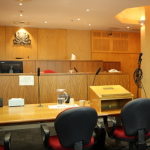Court Upholds 30-Year Prison Sentence for Domestic Murder

On 21 September 2018, the Australian Capital Territory Court of Appeal dismissed Magad Al-Harazi’s appeal against the severity of his 30-year sentence for murdering his wife Sabah Al-Mdwali.
The relationship
The couple met in 2005 and married in Yemen a year later.
Mrs Al-Mdwali migrated to Canberra with her parents and siblings in 2007, and had a son that year. Mr Al-Harazi joined his wife the next year, and they had a daughter in 2009 and a second son in 2014.
The couple returned to Yemen in 2011 with a view to living there permanently, but came back to Australia on Mrs Al-Mdwali’s insistence in December 2014 because she missed her parents.
The marriage was riddled with disputes and there was some evidence of domestic violence, the first such incident occurring shortly after the couple’s return to Australia and the next in late January 2015.
The incident
28-year old Mrs Al-Mdwali was fatally stabbed in the early hours of 17 March 2015 in their Canberra home.
36-year old Mr Al-Harazi attended the police station with his three children and told police his father-in-law and brother-in-law were responsible for the murder.
Police attended the Al-Harazi residence to find the deceased, and arrested both the father-in-law and brother-in-law.
However, police almost immediately realised the suspects were unlikely to have been responsible, and both were released.
Police then formed the view that Mr Al-Harazi was responsible for his wife’s death.
At around 10:30 pm on 17 March 2015, the same day of the killing, he was arrested and charged with murder in under section 12 of the Crimes Act 1900 (ACT), which attracts a maximum penalty of imprisonment for life.
The trial
Mr Al-Harazi’s pleaded not guilty and his case ultimately proceeded to a five week jury trial in the A.C.T. Supreme Court.
The prosecution’s case was based entirely on circumstantial evidence.
The defendant testified that he was not guilty, but the jury nevertheless found him guilty as charged.
In August 2017, Mr Al-Harazi was sentenced to 30 years’ imprisonment, with a non-parole period of 21 years.
Application for leave to appeal
On 2 August 2018, Mr Al-Harazi applied for leave (permission) to appeal.
He needed this permission because the application was lodged out of time. In that regard, Al-Harazi’s sentencing occurred on 10 August 2017 but he did not lodge the appeal until nearly a year later, on 2 August 2018.
The application was made in respect of both his conviction and the severity of his sentence.
The grounds of the leave application were essentially that Mr Al-Harazi had previously lied to police and the court because he was mentally impaired, and that he now desired to come clean and tell the truth.
The A.C.T. Court of Appeal noted in its judgement that Al-Harazi wanted to “explain why he committed the crime, what exactly happened before the murder”, because this would help the court “understand his reasons and motive so that it would look at the case in a different way”.
However, the court dismissed his application for leave on the basis that it:
- It was out of time and he provided no adequate explanation for this, and
- The grounds of challenging the conviction or sentence did not disclose an arguable basis for interfering with either.
This meant the court refused to hear the appeal itself.
Timing of appeals
The case emphasises the importance of lodging appeals in a timely manner and, if they are lodged out-of-time, having cogent and compelling reasons to support any application for leave.
In New South Wales, appeals from the local to the district court must be lodged within 28, unless leave is granted in which case it is up to 3 months.
Notices of Intention to Appeal against proceedings in the district court, such as trials and sentencings, normally need to be lodged within 28 days, and Notices of Appeal within 6 months of that date unless extensions of time are lodged.






